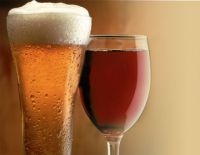A pair of articles recently addressed different angles on the notion that moderate alcohol use might actually be healthy in some regard. One of the pieces, a syndicated story that was widely picked up as part of a package on dieting, is a bit more of a cheerleader piece for the general idea, noting:
More than two decades' worth of studies have credited daily moderate alcohol consumption with preventing heart attacks and strokes, helping to regulate insulin, staving off age-related dementia and even preventing osteoporosis and certain cancers. Other studies have suggested that adults who enjoy a drink or two daily have fewer incidents of emergency-room visits, fewer gallstones and intestinal disorders and even fewer bouts with the common cold.
The hook here is the supposedly surprising conclusion that although red wine is getting all the buzz (so to speak) for its inherent health benefits, beer actually offers more likelihood of the same benefits, plus additional ones. For instance, it's got five times the amount of an antioxidant that is tied to raising good cholesterol and preventing some forms of cancer; hops contain "plant-based estrogens that have been found to inhibit prostate, breast and colon cancer"; and microbrews typically don't filter out yeast, leaving a lot of vitamins and minerals in the mix.
"Beer is 93 percent water, no fat, no cholesterol, no triglycerides, no sugar," Gifford-Jones said. "(Beer has) significant amounts of magnesium and potassium and other minerals as well as vitamins B2, B6 and folic acid … it's a damn good beverage."
Naturally there's got to be a catch, and of course, the catch is this is all tied to moderate use, not the kind of heavy use that has clearly associated health risks. And in another article from Time, another catch may be media hype that overplays supposed benefits in the first place. Time reports on a new study appearing in the journal Neurology that studied elderly Italians over the course of a 3.5 year period, and noted that those who drank about a glass of alcohol a day were 85% less likely to have signs of dementia than those who drank no alcohol. But before you leap to any conclusions, the study's authors try to make clear that it could be the case that the type of moderate lifestyle that encourages someone to drink only about a glass a day might be just as much responsible for the health benefit as the alcohol itself.
Seventy-year-olds who have a regular glass of wine, for example, might well be moderate drinkers precisely because they are still physically fit, eat reasonably well, are in good enough health that don't take serious medications that prevent them from drinking, and lead active social lives — all factors that, like moderate drinking, have been linked to staying mentally sharp. Researchers who study the effects of any one of these factors will, of course, try to separate it from the others. But when it comes right down to it, that's not always easy. There are some ethical problems that get in the way of researchers force-feeding patients pre-determined quantities of alcohol. Without that kind of control over study subjects, however, scientists are limited in what they can measure.
The silver lining in all of this, as Time points out, is that media hype typically amplifies or overplays things, but often there's a kernel of truth at the heart of the headline:
Alcohol could offer some protection against cognitive decline, after all. Moderate alcohol consumption has been linked with reduced risk of vascular disease, and good vascular health could slow the progression of dementia. The study authors note that some experiments show that ethanol encourages the release of a brain chemical that could be responsible for improved memory; that alcohol is associated with high levels of HDL cholesterol, linked to better coronary health; and that anti-oxidants in wine, the main source of the elderly Italians' alcohol intake, might also boost cognitive performance.
In other words, regardless of the hype, the studies definitely seem to be onto something, and continuing study seems worthwhile. Just don't get your hopes up too high any time soon. Now if only that pesky word "moderate" weren't so key to unlocking all of these benefits...





















